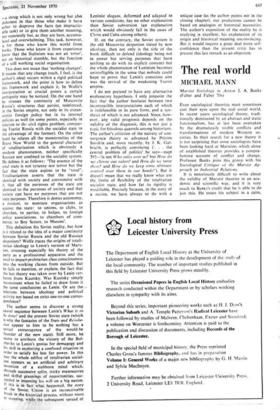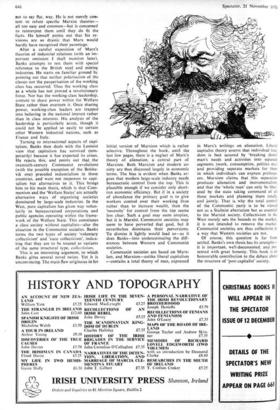The real world
MICHAEL MANN
Marxist Sociology in Action J. A. Banks (Faber and Faber 70s) Even sociological theorists must sometimes cast their eyes upon the real social world. In recent years sociological theory, tradi- tionally dominated by an abstract and static functionalism, has at last been overtaken by the dramaticaily visible conflicts and transformations of modern Western so- cieties. In their search for a new theory it is not surprising that some sociologists have been looking hard at Marxism, which alone of established theories provides a compre- hensive account of conflict and change. Professor Banks joins this group with his Sociological Critique of the Marxist Ap- proach to Industrial Relations.
It is notoriously difficult to write about the validity of Marxist theories in an aca- demic and scientific way, and it is very much to Banks's credit that he is able to do just this. He treats his subject in a calm,
not to say flat, way. He is not merely cone tent to refute specific Marxist theories— all too easy and common—but is concerned to reinterpret them until they do fit the facts. He himself points out that his re- visions are so drastic that Marx would hardly have recognised their parentage.
After a careful exposition of Marx's theories of industrial relations (with an im- portant omission I shall mention later), Banks attempts to test them with special reference to the British steel and mining industries. He starts on familiar ground by pointing out that neither polarisation of the classes nor the pauperisation of the working class has occurred. Thus the working class as a whole has not proved a revolutionary force. Nor has the working-class leadership, content to share power within the Welfare State rather than overturn it. Once sharing power, working-class leaders are trapped into believing in the national interest rather than in class interests. His analysis of the leadership is particularly acute, though it could not be applied so easily to certain other Western industrial nations, such as France and Italy.
Turning to international aspects of capi- talism, Banks then deals with the Leninist view that capitalism has survived (tem- porarily) because it has exported its crises. He rejects this, and points out that the twentieth-century Communist revolutions (with the possible exception of the Bolshe- vik one) preceded industrialism in those countries, and were not responses to capi- talism but alternatives to it. This brings him to his main thesis, which is that Com- munism and the 'Welfare States' are actually alternative ways of organising societies dominated by large-scale industries. In the West, pure capitalism has given way volun- tarily to bureaucratised corporations and public agencies operating within the frame- work of the Welfare State. This constitutes a class society without capitalists—also the situation in the Communist societies. Banks terms the two types of society 'voluntary collectivism' and 'state collectivism', indica- ting that they are to be treated as variants of the same structural type, collectivism.
This is an interesting argument, to which Banks giVes several novel twists. Yet it is unconvincing. The main flaw originates in his
initial version of Marxism which is rather selective. Throughout the book, until the last few pages, there is a neglect of Marx's theory of alienation, a central part of Marxism. Both Marxism and modern so- ciety are thus discussed largely in economic terms. The bias is evident when Banks ar-, gues that modern large-scale industry needs bureaucratic control from the top. This is plausible enough if we consider only short- run economic efficiency. But if in a society of abundance the primary goal is to give workers control over their working lives rather than to increase wealth, then the 'necessity' for control from the top seems less clear. Such a goal may seem utopian, but it is Marxist. Communist societies may seem to have perverted that goal, but it nevertheless dominates their perversions. To dismiss it lightly would lead us—as it does Banks—into underestimating the diff- erences between Western and Communist societies.
Communist societies are based on Marx{ ism, and Marxism—unlike liberal capitalism —contains a total theory of man, expressed in Marx's writings on alienation. Liberal capitalist theory asserts that individual free- dom is best secured by 'breaking down' man's needs and activities into separate segments (work, consumption, politics etc.) and providing separate markets for them in which individuals can express preferen- ces. Marxism claims that this separation produces alienation and instrumentalism. and that the 'whole man' can only be liber- ated by the state taking command of all these markets and planning them totally and jointly. That is why the total control of the Communist party is to be viewed not as a Stalinist aberration but as essential to the Marxist society. Collectivism in the West merely sets the bounds to the market; it is not intended to remove the market. Communist societies are thus collectivist in a way that Western societies are not.
Of course, this question is far from settled. Banks's own thesis has its strengths— it is important, well-documented, and pre- sented with great honesty. This book is an honourable contribution to the debate about the structure of 'post-capitalist' society.















































 Previous page
Previous page